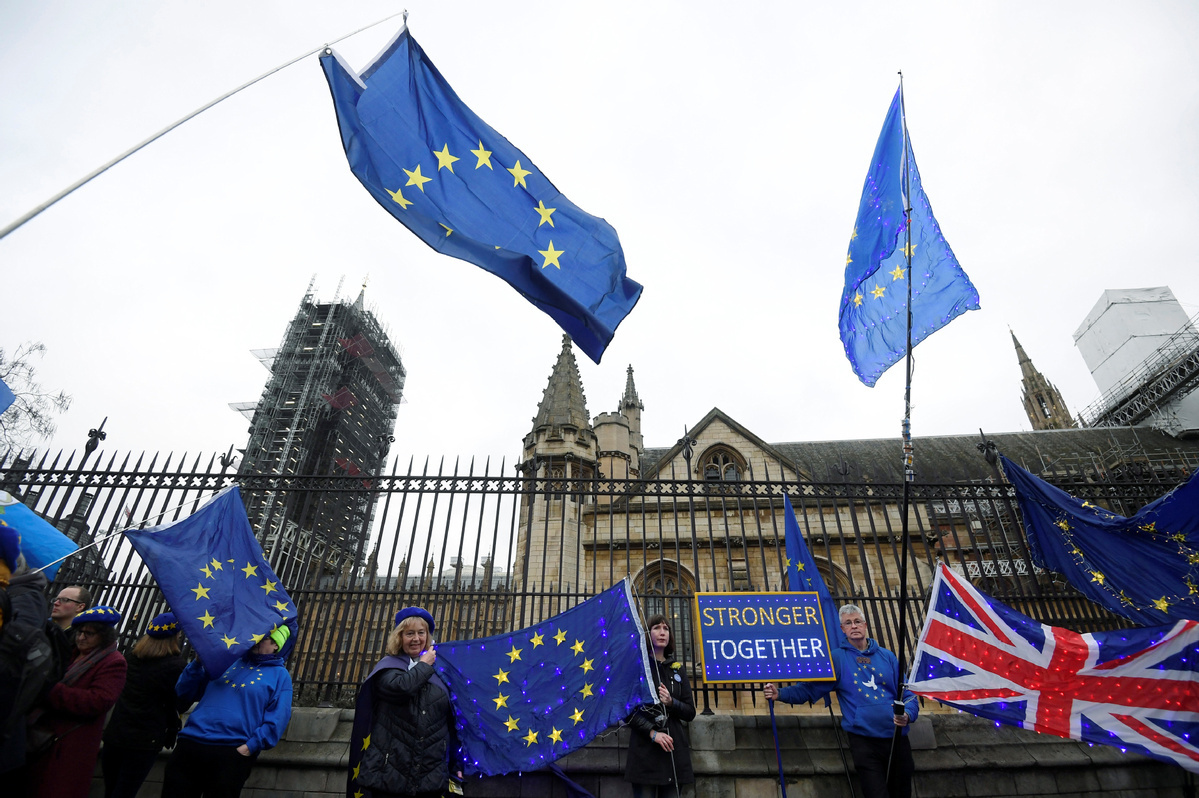
Anti-Brexit protesters holding an illuminating banner, EU and Union Jack flags protest outside the Houses of Parliament in London, Britain Jan 30, 2020. (Photo: Agencies)
Friday was the last day of the United Kingdom's membership of the European Union. There will have been no celebrations in Brussels where the mood is one of perplexity tinged with sadness at Britain's decision to leave the world's largest trading bloc. At the same time there is a determination to move on after the uncertainties of the past three years. One EU official likened the situation to a divorced couple living in the same house, sleeping in separate bedrooms. Now that the UK has stormed out, the EU can move on and tackle its own priorities including a new industrial strategy based on a green economy and securing its interests in a turbulent world.
British Prime Minister Boris Johnson won the December election on the slogan "Get Brexit done" but in reality although the UK has left the EU, Brexit is far from done. Little will change on Feb 1 as the UK has until the end of the year to negotiate a new deal with the EU covering trade, security and a host of other policy areas. Crucially, however, the UK will no longer have a seat at the EU table.
There are few experts who believe a deal is possible in just a few months. More likely it means years more arguments and disputes. The divisions within the UK show no signs of healing. In Scotland, which voted overwhelmingly to remain in the EU, there are growing calls for independence. In Northern Ireland, where there are concerns at the new border arrangements, there is renewed momentum for a united Ireland.
On the economic front, the government's own figures show that Brexit will inflict significant damage on the UK economy as a result of leaving the single market and customs union. The UK also faces very difficult choices. Some powerful voices advocate moving away from the EU's rules and regulations as far as possible regardless of the damage to the economy. They are often described as wanting to establish a "Singapore on the Thames". Others, including most business sectors, wish to stay close to the single market and customs union, even though they will have no say in shaping future rules.
It's the same choice again on the EU's security systems and technical agencies. How will the UK access the police databases of the EU members? Will it set up expensive new agencies to duplicate what is being done for the testing of medicines and chemicals?
Britain will also have to negotiate hundreds of new trade deals with countries around the world. And instead of having the clout of being part of the world's biggest market it will be out on its own dealing with China, the United States, India and Japan.
Johnson was hoping for a quick trade deal with the US, but it is now clear that US President Donald Trump will seek to impose conditions regarding food imports and access to the British health sector as well as foreign policy alignment unacceptable to the British public.
The EU's Position
Ursula von der Leyen, the president of the European Commission, has said that the EU is ready to offer the UK a zero-tariff, zero-quota, free-trade deal, in exchange for signing up to core EU standards to protect the environment, workers' and consumers' rights, and avoiding unfair state subsidies. The UK hopes of divide and rule are likely to be dashed again as all 27 member states support this approach as it will avoid unfair competition by a major economic power on their doorstep.
But trade is only part of the upcoming talks that will start in early March. That leaves as little as eight months to strike an agreement, because the final text needs to be put to the European Parliament for ratification by October or November.
The EU envisages one single agreement with the UK, with two core parts: one on economic relations, including trade, but also energy, fish and transport. The second part will cover security, including police co-operation, data-sharing and external security. The entire deal will be underpinned by one dispute settlement mechanism.
Global Britain?
Boris Johnson talks of "Global Britain" without attempting to define what this means. The reality is that Britain will remain closer to its EU partners than the US on most global issues – support for the multilateral trading system, climate change, the Iran nuclear deal and support for a two-state solution in the Arab-Israeli dispute. London has also shown it is prepared to go against the US in agreeing this week to the involvement of Huawei in its 5G system. Johnson has emphasised the importance of China for the global economy and while he may not talk of a "golden era" it is likely that he will seek an ambitious trade deal with Beijing.
Overall the UK will be weakened as a result of Brexit. It has lost economic growth, lost foreign investment and failed to increase productivity. Politically it cannot hope to have the same influence as it has had as part of the EU with a population of about 500 million. The UK is already discovering that "taking back control" has serious consequences, all negative.


